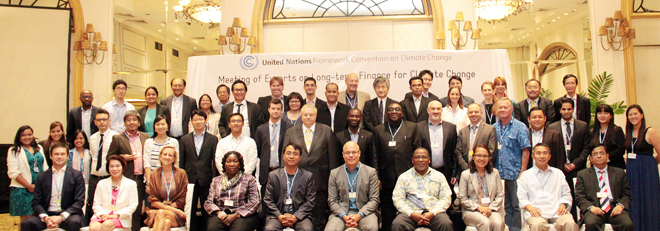Participants at the First Meeting of Experts on Long-term Finance (LTF) considered possible pathways for mobilizing scaled-up climate finance, parameters for identifying such pathways, and enabling environments and policy frameworks in the context of mobilization and effective deployment of climate finance in developing countries.
 17 July 2013: Participants at the First Meeting of Experts on Long-term Finance (LTF) considered possible pathways for mobilizing scaled-up climate finance, parameters for identifying such pathways, and enabling environments and policy frameworks in the context of mobilization and effective deployment of climate finance in developing countries.
17 July 2013: Participants at the First Meeting of Experts on Long-term Finance (LTF) considered possible pathways for mobilizing scaled-up climate finance, parameters for identifying such pathways, and enabling environments and policy frameworks in the context of mobilization and effective deployment of climate finance in developing countries.
The meeting, which convened from 16-17 July 2013 in Manila, the Philippines, focused on aspects of the extended work programme on LTF under the UN Framework Convention on Climate Change (UNFCCC). It was part of an extended work programme on LTF initiated at the 18th session of the UNFCCC Conference of the Parties (COP 18) in Doha, Qatar, at the end of 2012. The extended work programme, on mobilizing scaled-up climate finance to US$100 billion per year by 2020, is expected to inform and set the tone for an in-session high-level ministerial dialogue during COP 19, which will convene from 11-22 November 2013 in Warsaw, Poland.
Over 40 participants attended the meeting, including one minister from Nicaragua, nine finance and planning representatives, seven from environment ministries and agencies, seven from civil society, fifteen from international organizations and seven from the private sector. The Co-Chairs of the extended work programme on LTF, Naderev Saño, the Philippines, and Mark Storey, Sweden, received a protest statement from climate justice and debt campaigners.
At the close of the expert meeting, it was clear that further consideration of the issue would be required, particularly on pathways for mobilizing climate finance towards the US$100 billion goal. Experts still must contend with, inter alia, possible ways to define climate finance, lessons from the fast-start finance period, and approaches for monitoring, reporting, and verification (MRV) systems for finance to ensure consistency and transparency on resources provided to developing countries. Experts also addressed the practical realities and constraints faced by developed country parties in the context of public finance.
The Second Expert Meeting in August will be a further opportunity to separate the technical and analytical elements from issues that require discussion at the political level. As experts grapple with the practical realities and constraints faced by developed country parties, and growing calls from developing countries for scaled-up finance, the discussions at this session underscored the central role that finance and finance-related bodies will play in shaping the post-2020 climate architecture. [IISD RS coverage of the expert meeting]